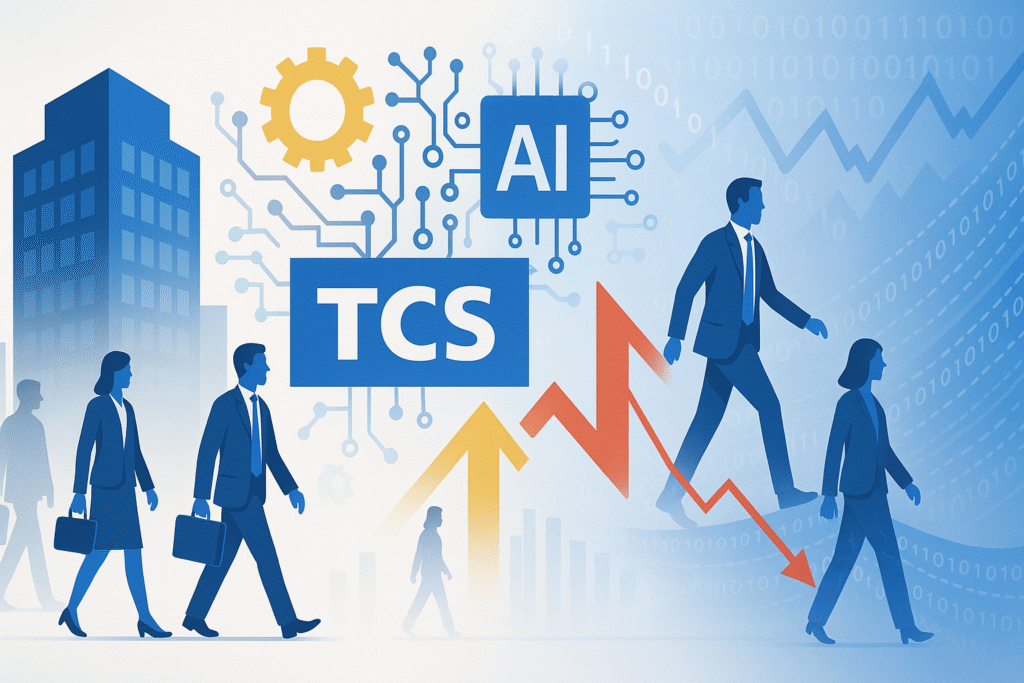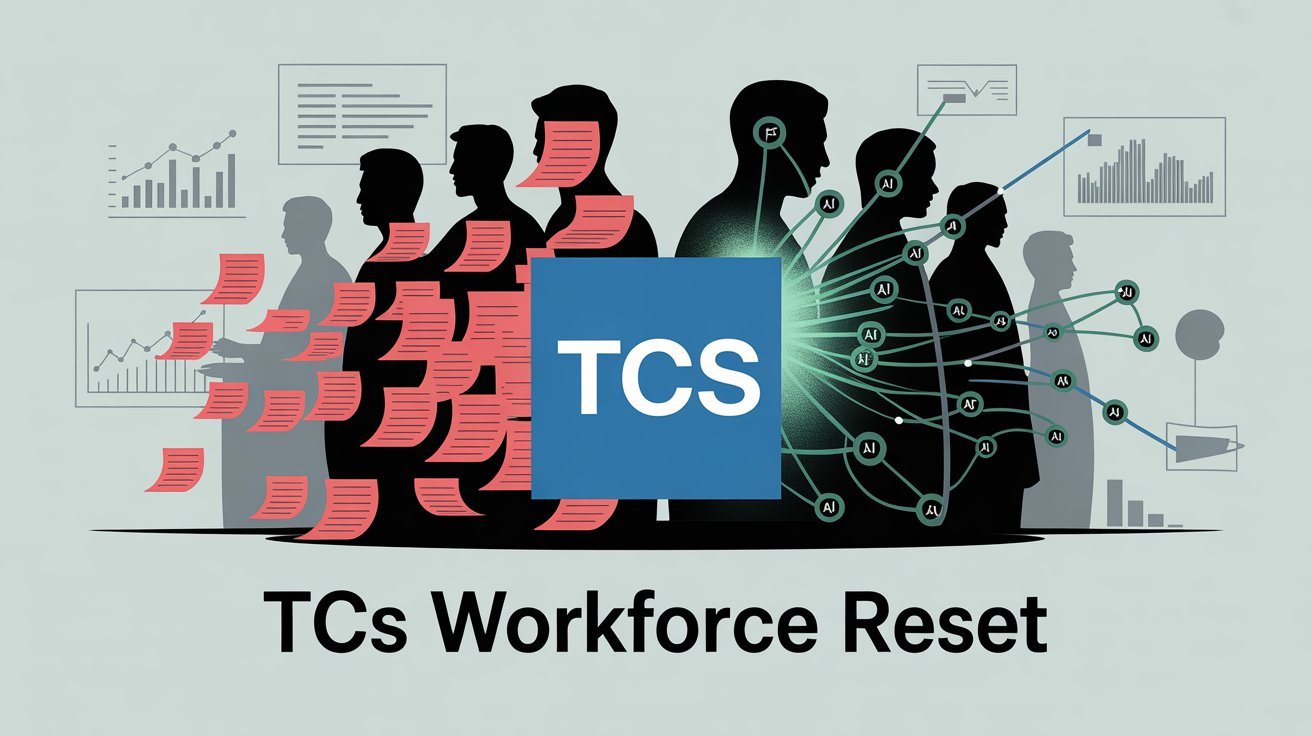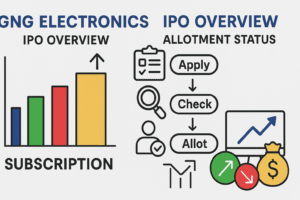
TCS Announces Major Workforce Reduction: 12,000 Jobs Cut in Strategic Restructuring
India’s largest IT services company implements 2% workforce reduction amid AI transformation and market pressures
Executive Summary
🚨 Key Takeaway
Tata Consultancy Services (TCS) has announced plans to lay off approximately 12,000 employees (2% of its global workforce) in FY26 as part of a strategic restructuring initiative. This marks a significant shift for India’s largest IT services company as it adapts to AI-driven market changes and evolving client demands.
Background and Context
The announcement comes as a significant development in the Indian IT sector, particularly given TCS’s status as the country’s largest technology services provider. As of June 30, 2025, TCS’s workforce stood at 6,13,069, having increased by 5,000 employees in the recently concluded April-June quarter.
This restructuring initiative represents TCS’s response to multiple converging factors: the rapid advancement of artificial intelligence technologies, changing client demands, global economic uncertainties, and the need to realign its workforce with future market requirements.
Strategic Rationale
The company is focusing on large-scale deployment of artificial intelligence (AI) and other new technologies, which are reshaping demand across the IT sector. TCS leadership has emphasized that this move is not primarily driven by cost-cutting measures but rather by the challenges of redeploying talent whose current skills no longer align with the company’s evolving requirements.
⚠️ Important Note
The company noted that the layoffs would focus on employees in middle and senior roles, and emphasized that the move would not impact client service delivery.
Industry Context
TCS is not operating in isolation. As per Layoffs.fyi – a platform that tracks global tech industry layoffs – over 80,000 tech workers have been laid off across 169 tech companies in 2025 alone. In 2024, that number stood at a staggering 1.5 lakh across 551 tech companies.
Major technology companies worldwide are undergoing similar transformations. Microsoft, the second most valuable publicly listed company after Nvidia globally, has so far laid off over 15,000 employees in 2025, that is 7 per cent of the company’s global workforce.
Impact Analysis: Who Will Be Affected?
Target Demographics
Most of those impacted are expected to be at the middle and senior levels. This strategic focus on mid-to-senior management positions reflects TCS’s broader organizational restructuring goals.
🎯 Primary Impact Groups
- Middle Management: Supervisory and managerial roles that may be streamlined through AI automation
- Senior Professionals: Experienced staff whose specialized skills may not align with current market demands
- Legacy Technology Experts: Professionals working in traditional IT areas being phased out
Skills Realignment Challenge
Although TCS clarified that AI is not directly replacing jobs, analysts believe that roles like manual testing are shrinking, and some senior professionals are struggling to adapt to newer, tech-driven environments.
The company’s transformation strategy involves significant investment in emerging technologies. TCS now has over 1.14 lakh employees trained in advanced AI skills, and during the quarter alone, associates spent 15 million hours upgrading themselves in emerging technologies.
📊 TCS Workforce Transformation Trends
Geographic and Domain Distribution
TCS, which had a total headcount of 6.13 lakh employees as of June 2025, will implement the layoffs across various domains and geographies. This suggests a comprehensive approach rather than targeting specific regional operations or business units.
Timing and Implementation
The layoffs are planned for implementation throughout FY26, providing the company with a structured approach to manage the transition. The timing of these cuts, planned for the 2026 financial year, provides TCS with a buffer period to implement the changes gradually while maintaining service quality for existing clients.
Market Response and Financial Impact
Stock Market Reaction
Shares of Tata Consultancy Services Ltd (TCS) slipped nearly 2% to ₹3,094.30 on Monday, following the company’s announcement of a planned 2% reduction in its global workforce. The immediate market response reflects investor concerns about the broader implications of the restructuring.
Sector-Wide Impact
Shares of largecap IT names such as Wipro Ltd and Infosys Ltd fell up to 3 per cent in Monday’s trade after the largest software exporter Tata Consultancy Services (TCS) said it was looking to cut 2 per cent jobs.
The ripple effect across the IT sector demonstrates the significant influence TCS holds in the industry. The BSE IT index fell 0.57 per cent to 34,901.18. A total of 37 index constituents declined; 17 were trading higher.
Recent Financial Performance
Despite the layoff announcement, TCS reported solid financial results for Q1 FY26. TCS announced a net profit of Rs 12,760 crore for Q1 FY26 — reflecting a year-on-year growth of 6 per cent. Revenue from operations rose 1.3 per cent to Rs 63,437 crore during the April-June quarter.
💰 Q1 FY26 Financial Highlights
- Net Profit: ₹12,760 crore (6% YoY growth)
- Revenue: ₹63,437 crore (1.3% YoY growth)
- Interim Dividend: ₹11 per share declared
- Workforce Growth: 5,000 employees added in Q1
Analyst Perspectives
Citi reiterated its “sell” rating on TCS with a target price of ₹3,135, suggesting that the workforce cut could be attributed to multiple factors such as margin pressures, skill gaps.
However, long-term sentiment remains mixed. Of the 51 analysts tracking the stock, 32 maintain a “buy” rating, 15 recommend “hold”, and only four advise “sell”.
Industry Challenges
TCS MD and Chief Executive K Krithivasan recently said the company is experiencing a “demand contraction” due to the continued uncertainties on the macroeconomic and geopolitical fronts, and added that he does not see a double-digit revenue growth in FY26.
⚠️ Market Pressures
Industry observers note that clients are demanding dramatic price reductions of 20-30% for IT services while expecting the same quality and delivery speeds.
Employee Support and Transition Measures
Comprehensive Support Package
TCS has outlined a comprehensive support structure for affected employees. TCS has assured that impacted employees will receive notice period compensation, additional severance benefits, extended insurance coverage, and career transition assistance.
🤝 Employee Support Benefits
- Notice Period Compensation: Full salary during notice period
- Severance Packages: Additional financial support based on tenure
- Extended Insurance: Continued health coverage during transition
- Outplacement Services: Professional job placement assistance
- Career Counseling: Guidance for career transition and reskilling
Company’s Commitment Statement
“We understand that this is a challenging time for our colleagues likely to be affected. We thank them for their service and will make all efforts to provide appropriate benefits, outplacement, counselling, and support as they transition to new opportunities,” the company said.
Reskilling and Redeployment Efforts
Before implementing layoffs, TCS has been actively pursuing reskilling initiatives. Towards this, a number of reskilling and redeployment initiatives have been underway.
The company’s investment in employee development remains substantial. TCS now has over 1.14 lakh employees trained in advanced AI skills, and during the quarter alone, associates spent 15 million hours upgrading themselves in emerging technologies.
Industry Context and Precedent
This is the second time the company has announced a layoff. The last instance was in 2012 when the firm laid off around 2,500 employees due to underperformance.
Timeline and Process
The restructuring will be implemented gradually throughout FY26, allowing for careful management of the transition process. This phased approach aims to minimize disruption to both remaining employees and client services.
⚠️ Additional Context
The layoffs come just days after several TCS employees challenged the company’s revised bench policy in court. The policy restricts employees from staying unbilled for more than 35 days a year and mandates a minimum of 225 billable days annually.
Long-term Workforce Strategy
TCS’s approach reflects a broader industry shift toward specialized skills and AI integration. The company continues to hire in strategic areas while optimizing its workforce structure to align with future market demands and technological capabilities.
Frequently Asked Questions
TCS plans to lay off approximately 12,000 employees, representing about 2% of its global workforce of 613,069. The layoffs will be implemented throughout FY26, with most impacts expected to affect middle and senior-level employees across various domains and geographies.
TCS states that the layoffs are part of becoming a “future-ready organization” and are not primarily driven by cost-cutting or AI automation. Instead, they’re due to challenges in redeploying talent whose current skills no longer align with the company’s evolving requirements as it focuses on AI deployment and new technologies.
TCS will provide comprehensive support including notice period compensation, severance packages, extended insurance coverage, outplacement services, career counseling, and job transition assistance. The company emphasizes its commitment to helping affected employees transition to new opportunities.
TCS shares dropped nearly 2% to ₹3,094.30 following the announcement. The broader IT sector was also affected, with the BSE IT index falling 0.57% and 37 IT stocks declining. Other major IT companies like Wipro and Infosys also saw their shares fall by up to 3%.
Yes, TCS is part of a global tech industry trend. According to Layoffs.fyi, over 80,000 tech workers have been laid off across 169 companies in 2025 alone. Major companies like Microsoft have also announced significant layoffs, with over 15,000 employees affected in 2025.
TCS has emphasized that the layoffs will not impact client service delivery. The company is implementing the changes gradually throughout FY26 to ensure service quality is maintained while the organizational restructuring takes place.
TCS has over 1.14 lakh employees trained in advanced AI skills. During Q1 alone, associates spent 15 million hours upgrading themselves in emerging technologies. The company is focusing on large-scale AI deployment, new market expansion, and creating next-generation infrastructure.
Industry Impact and Future Outlook
The Changing Landscape of IT Services
The TCS announcement reflects a fundamental shift in the Indian IT services sector. Companies are grappling with the dual challenge of adapting to AI-driven automation while managing client expectations for reduced costs and faster delivery. This transformation is reshaping traditional employment models across the industry.
The focus on middle and senior management positions particularly highlights how AI and automation are changing organizational structures. As machine learning algorithms become capable of handling complex analytical and decision-making tasks, the need for multiple layers of human oversight is diminishing.
Economic and Geopolitical Factors
Beyond technological disruption, TCS faces significant external pressures. Clients across various industries have reduced their technology spending on non-essential projects due to economic uncertainty, persistent inflation, and unclear trade policies affecting international markets.
CEO K. Krithivasan explained that delays in decision-making experienced in the preceding quarter have “intensified” now, and hoped for the discretionary spends — a prime mover of revenue growth for IT companies — to return once the uncertainties ebb.
📊 Global Tech Layoffs Comparison 2025
Skills Evolution and Workforce Transformation
The emphasis on reskilling at TCS represents a broader industry recognition that traditional IT roles are evolving rapidly. Manual testing, routine coding, and repetitive analytical tasks are increasingly being automated, creating demand for higher-level skills in AI implementation, strategic consulting, and complex problem-solving.
Companies that adapt successfully will likely emerge stronger, with more specialized and valuable service offerings. However, the human cost of this transition cannot be overlooked, particularly for experienced professionals who may struggle to retrain for rapidly evolving technology landscapes.
Long-term Industry Implications
The TCS restructuring signals a potential reshaping of India’s IT sector employment model. Traditional pyramid structures with multiple management layers may give way to flatter organizations with more specialized roles and greater reliance on AI-augmented processes.
🔮 Future Outlook
Industry experts predict that successful IT companies will increasingly focus on high-value consulting, AI implementation services, and specialized technical expertise rather than traditional labor-intensive service delivery models. This transformation, while challenging in the short term, may position Indian IT companies for stronger competitive positioning in the global market.
Recommendations for IT Professionals
For IT professionals, this development underscores the critical importance of continuous learning and adaptation. Skills in AI/ML, cloud computing, cybersecurity, and strategic business consulting are becoming increasingly valuable, while routine technical tasks face automation pressure.
The industry transformation also highlights the importance of developing strong interpersonal and strategic thinking skills that complement technical expertise and are less susceptible to automation.
TCS Bench Policy Update: 225 Billing Days Must, Only 35 Days on Bench.








Post Comment